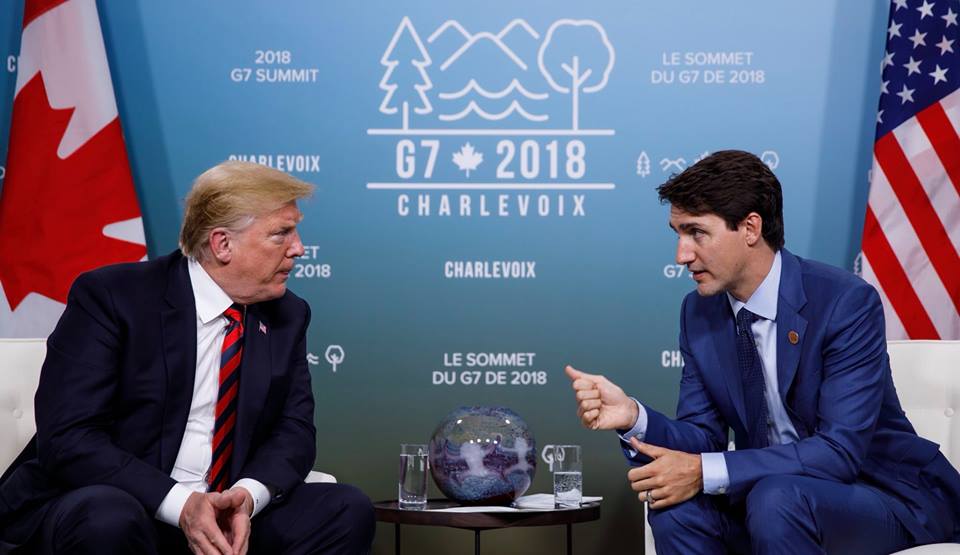
QUEBEC — The Trudeau government has told President Donald Trump he needs to get rid of the punishing U.S. tariffs on Canadian steel and aluminum if there is any hope of successfully renegotiating the North American Free Trade Agreement.
Prime Minister Justin Trudeau and Finance Minister Bill Morneau said that message was communicated clearly to Trump during his meetings at the G7 leaders’ summit, which is wrapping up Saturday.
Trudeau said he told Trump directly that Canadians “particularly did not take lightly the fact that it’s based on a national security reason” and held firm to the government’s threat of retaliation.
“Canadians are polite, we’re reasonable, but we also will not be pushed around.”
But Trump appeared to take Trudeau’s criticism personally, and denounced the prime minister hours after he departed the G7 summit on Saturday.
“Based on Justin’s false statements at his news conference, and the fact that Canada is charging massive Tariffs to our U.S. farmers, workers and companies, I have instructed our U.S. Reps not to endorse the Communique as we look at Tariffs on automobiles flooding the U.S. Market!,” the president wrote.
Trump then called Trudeau ”Very dishonest & weak” in a follow-up tweet.
It was not immediately clear where the new round of aggression would leave the two leaders and their mercurial attempts to find trade peace.
Earlier while still in Quebec, Trump said he wants to make a deal on NAFTA, and he’s open to working with the current pact or striking separate agreements with Canada and Mexico — as long as they agree to renegotiate every five years.
Canada wants a deal too, but Trudeau reiterated the government view that the U.S.’s proposed five-year sunset clause is a non-starter.
Canada is now adding the tariffs to its list of deal breakers on NAFTA. Morneau said progress is being made, but more work needs to be done to conclude the negotiations.
“We’re not going to be able to do that work under the threat of tariffs. And we’re not going to be able to do that work when our retaliatory tariffs, which are real, they’re significant,” Morneau said in a Saturday interview.
The government announced it would impose more than $16.6-billion in retaliatory tariffs, effective July 1, on a variety of U.S. goods. Mexico and the European Union have also planned retaliatory tariff packages.
Trump said that would be a bad idea.
“If they retaliate, they’re making a mistake,” he said.
“They do so much more business with us than we do with them … the numbers are so astronomically against them ? we win that war a thousand times out of a thousand.”
Trudeau said Canada wasn’t backing down.
“I highlighted that it was not helping in our renegotiation of NAFTA and that it would be with regret, but it would be with absolute certainty and firmness that we move forward with retaliatory measures on July 1.”
Trudeau and the other G7 leaders used their meeting to try to persuade Trump to abandon the tariffs, which affect all of America’s G7 allies.
British Prime Minister Theresa May said the other G7 leaders registered their “deep disappointment at the unjustified decision by the U.S.” on its closest allies.
“The loss of trade through tariffs undermines competition, reduces productivity and removes the incentive to innovate and ultimately makes everyone poorer,” she said.
Once again, Trump emphasized that the days of the U.S. getting the short end of the stick in its trading relationships with the world were over under his watch.
And he made clear that extends to the current deal the U.S. is renegotiating with its continental neighbours, Canada and Mexico.
“We’re either going to have NAFTA in a better negotiated form or we’re going to have two deals,” the U.S. president said.
But by insisting on re-negotiating every five years, Trump is diametrically opposed with Canada, which says the sunset clause would create perpetual uncertainty and harm long-term investment.
Disagreement over the sunset clause was the deal breaker that scuttled a possible meeting between Trump and Trudeau in Washington late last month in an attempt to bring the NAFTA talks to a conclusion.
Vice President Mike Pence told Trudeau he would have to agree to that before Trump would agree to meet him.
Trudeau refused, and the meeting was off. But the lead ministers from both countries talked trade on the sidelines of the G7 leaders’ meeting on Friday.
“On NAFTA we either leave it the way it is as a three-some deal with Canada, the United States and Mexico and change it very substantially — we’re talking about very big changes. Or we’re going to make a deal directly with Canada, directly with Mexico,” Trump said Saturday.
“If a deal isn’t made, that would be a very bad thing for Canada and a very bad thing for Mexico. To United States, frankly, it would be a good thing but I’m not looking to do that. I’m not looking to play that game.”
Trump repeated his criticism of Canada’s supply managed dairy industry, one of his favourite targets in Twitter posts, including this week prior to his arrival in Canada.
Pierre Lampron, the president of Dairy Farmers of Canada, shot back at Trump’s claims about his industry.
“President Trump is targeting the dairy sector because he wants to dump U.S. dairy into Canada,” Lampron told The Canadian Press, adding that Canada imports five times more dairy from the U.S. than it exports.
“President Trump wants nothing less than wiping out Canadian dairy farming.”